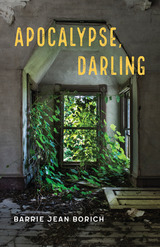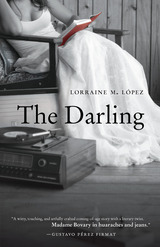2 books about Darling

Apocalypse, Darling
Barrie Jean Borich
The Ohio State University Press, 2018
From award-winning author Barrie Jean Borich comes Apocalypse, Darling, a narrative, lyric exploration of the clash between old and new. Set in the steel mill regions of Chicago and in Northwest Indiana, the story centers on Borich’s return to a decimated landscape for a misbegotten wedding in which her spouse’s father marries his high school sweetheart. The book is a lilting journey into an ill-fated moment, where families attempt to find communion in tense gathering spaces and across their most formative disappointments. Borich tells the story of the industrial heartland that produced the steel that made American cities, but also one of the most toxic environmental sites in the world.
As concise as a poem and as sweeping as an epic novel, Apocalypse, Darling explores the intersection of American traditional and self-invented social identities and the destruction and re-greening of industrial cityscapes. Borich asks: can toxic landscapes actually be remediated and can patriarchal fathers ever really be forgiven? In a political climate where Borich is forced to daily re-enter the toxic wastelands she thought she’d long left behind, Apocalypse, Darling is an urgent collision of broken spaces, dysfunctional affections, and the reach toward familial and environmental repair.
[more]

The Darling
Lorraine M. López
University of Arizona Press, 2015
Latina bibliophile Caridad falls out of love again and again, with much help from Anton Chekhov, Gustave Flaubert, Theodore Dreiser, D. H. Lawrence, Vladimir Nabokov, Thomas Hardy, and other deceased white men of letters. Raised in a household of women, she rejects examples of womanhood offered by her long-suffering mother, her caustic eldest sister Felicia, and her pliant and sentimental middle sister Esperanza. Instead Caridad, a compulsive reader, educates herself about love and what it means to be a sentient and intelligent woman by reading classic literature written by men, and supplements this with life lessons gleaned from her relationships.
Though set in Los Angeles from the mid-1970s to the mid-1980s, the narrative reinscribes Anton Chekhov’s short story, “The Darling,” first published in 1899. Like Chekhov’s protagonist, Caridad engages in various relationships in her search for love and fulfillment. Rather than absorbing beliefs held by the men in her life, as does Chekhov’s heroine, Caridad instead draws on her lovers’ resources in attempting to improve and educate herself. Apart from Chekhov, various authors of classic literature further guide Caridad’s quest to find herself and to find love, inspiring her longing for love, while also enabling her to disentangle herself from unsatisfying to disastrous relationships by encouraging her to strive for an ideal.
In a moment of clarity, Caridad compares herself to a trapeze artist near the top of a striped tent as she flies from one man to the next, expecting to be caught and held until she is ready to leap again. Flying, she wonders—or is she falling?
Though set in Los Angeles from the mid-1970s to the mid-1980s, the narrative reinscribes Anton Chekhov’s short story, “The Darling,” first published in 1899. Like Chekhov’s protagonist, Caridad engages in various relationships in her search for love and fulfillment. Rather than absorbing beliefs held by the men in her life, as does Chekhov’s heroine, Caridad instead draws on her lovers’ resources in attempting to improve and educate herself. Apart from Chekhov, various authors of classic literature further guide Caridad’s quest to find herself and to find love, inspiring her longing for love, while also enabling her to disentangle herself from unsatisfying to disastrous relationships by encouraging her to strive for an ideal.
In a moment of clarity, Caridad compares herself to a trapeze artist near the top of a striped tent as she flies from one man to the next, expecting to be caught and held until she is ready to leap again. Flying, she wonders—or is she falling?
[more]
READERS
Browse our collection.
PUBLISHERS
See BiblioVault's publisher services.
STUDENT SERVICES
Files for college accessibility offices.
UChicago Accessibility Resources
home | accessibility | search | about | contact us
BiblioVault ® 2001 - 2024
The University of Chicago Press









